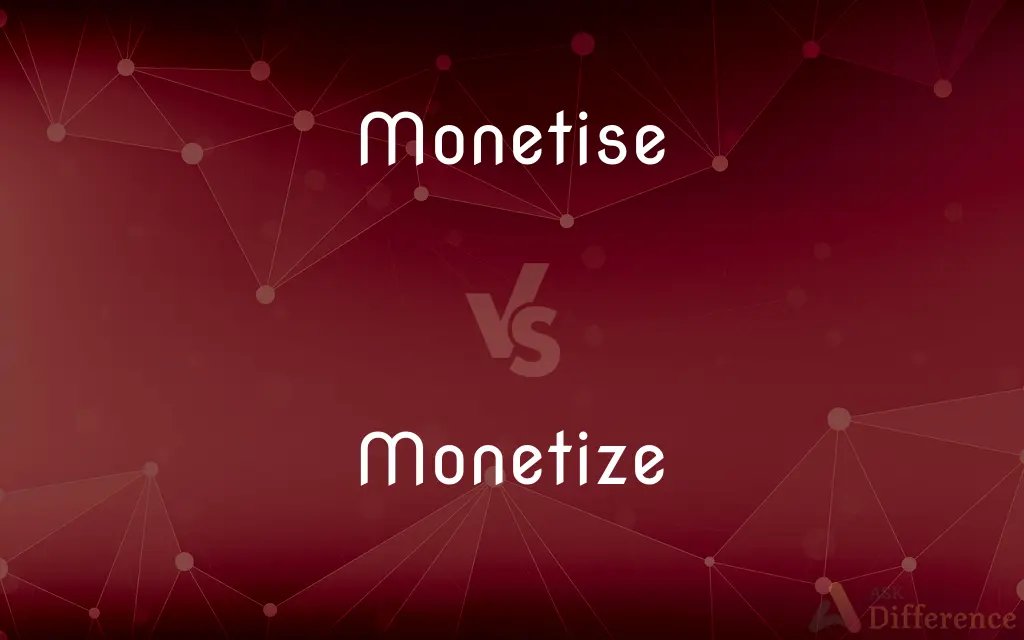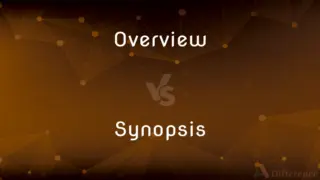Monetise vs. Monetize — What's the Difference?
By Tayyaba Rehman & Fiza Rafique — Updated on April 7, 2024
"Monetise" and "monetize" are variant spellings of the same term, with "monetize" being preferred in American English and "monetise" in British English, both referring to the process of turning something into a source of revenue.

Difference Between Monetise and Monetize
Table of Contents
ADVERTISEMENT
Key Differences
Both "monetise" and "monetize" refer to the act of generating revenue from an asset, service, or any other resource that previously did not produce income. The primary difference lies in the regional spelling preference, with "monetize" commonly used in the United States, while "monetise" is favored in the United Kingdom and other regions using British English. This distinction mirrors the broader differences in American and British spelling conventions.
The process they describe involves strategies like advertising, licensing, selling goods or services, or finding other innovative ways to make money from something. Whether one spells it with a "z" or an "s," the underlying concept of creating economic value from resources remains constant. The choice of spelling does not affect the meaning or application of the term in business or economic contexts.
The spelling variation can also be seen in other English words that have the "-ize" or "-ise" suffix, reflecting broader linguistic patterns rather than a difference in meaning. For instance, "organize" and "organise" follow the same pattern of American and British English preferences, respectively.
In digital and internet contexts, monetizing (or monetising) often refers to making money from websites, apps, or online services through methods such as subscription models, advertisements, or pay-per-use services. Despite the spelling differences, the strategies and goals of monetization are universally understood across English-speaking regions.
The choice between "monetise" and "monetize" typically depends on the intended audience or the regional standards of the publication or document. Writers and speakers often select the variant that aligns with their or their audience's preferred form of English, ensuring clarity and adherence to linguistic norms.
ADVERTISEMENT
Comparison Chart
Meaning
Turning something into revenue
Turning something into revenue
Preference
British English
American English
Application
Business, economics, digital media
Business, economics, digital media
Example Context
Monetising a blog through ads
Monetizing an app through in-app purchases
Linguistic Pattern
Part of broader British English spelling conventions (e.g., organise)
Part of broader American English spelling conventions (e.g., organize)
Compare with Definitions
Monetise
To convert into or express in the form of currency.
The company seeks to monetise its software by offering premium features.
Monetize
To profit from something that was previously free.
The new feature allows creators to monetize their videos directly.
Monetise
To profit from something that was previously free.
Monetising free online content can be challenging.
Monetize
The process of generating income through various means.
This workshop focuses on monetizing digital assets efficiently.
Monetise
Involves creating economic value from resources.
The app's popularity opened new avenues to monetise user interactions.
Monetize
To convert into or express in the form of currency.
Startups often look for innovative ways to monetize their user base.
Monetise
To establish a source of revenue from an asset or service.
They're exploring ways to monetise the website's traffic.
Monetize
To establish a source of revenue from an asset or service.
Monetizing social media content requires strategic planning.
Monetise
The process of generating income through various means.
The seminar will cover different strategies for monetising intellectual property.
Monetize
Involves creating economic value from resources.
Monetizing data analytics has become a major trend in the industry.
Monetise
Standard spelling of monetize
Monetize
To convert (an asset) into cash, as by selling the asset or using it as security for a loan.
Monetise
Give legal value to or establish as the legal tender of a country;
They monetized the lira
Monetize
To convert into a source of income
Monetized website visitors by selling advertising space.
Monetize
To express or render in terms of money
Monetize environmental benefits that stem from the avoidance of greenhouse gases.
Monetize
To purchase (government debt) in the open market using central bank funds, leading to an expansion of the money supply.
Monetize
To establish (a metal) as a currency, especially by minting coins.
Monetize
To convert (an economy or sector) from a system of barter to one based on the exchange of money.
Monetize
To convert something (especially a security) into currency.
Monetize
To mint money.
Monetize
To establish a currency as legal tender.
Monetize
(transitive) To make an activity profit-generating, particularly in computer and Internet-related activities.
We considered monetizing our computer help forums by inserting ad banners.
Monetize
To convert into money; to adopt as current money; as, to monetize silver.
Monetize
Give legal value to or establish as the legal tender of a country;
They monetized the lira
Common Curiosities
Does the choice of spelling affect understanding in international contexts?
Generally, both variants are understood across English-speaking regions, despite the spelling difference.
Is there a difference in meaning between "monetise" and "monetize"?
No, the difference is purely in spelling, reflecting American vs. British English preferences.
Can software and digital content be both monetised/monetized?
Yes, digital goods and services are common targets for monetization strategies.
Do other languages have similar variations in terms?
Yes, many languages have regional or dialectical variations that affect spelling and sometimes pronunciation.
How do companies decide on a monetisation/monetization strategy?
Companies consider their target audience, market potential, product type, and competitive landscape to choose the most effective strategy.
Can monetisation/monetization strategies vary by industry?
Definitely, strategies often need to be tailored to the specific dynamics and customer expectations of each industry.
Can both spellings be used interchangeably?
While the meaning remains the same, the choice of spelling should consider the regional audience or standards.
How do I know which spelling to use in my writing?
Consider your audience and the standard English variant you are using (American or British).
Is the process of monetisation/monetization only applicable to digital products?
No, it can apply to any product, service, or asset that has potential economic value.
Are there contexts where one spelling is more appropriate than the other?
Yes, "monetize" is preferred in American English contexts, and "monetise" in British English contexts.
Has the internet changed how things are monetised/monetized?
Absolutely, the internet has introduced new ways and platforms for monetization, expanding opportunities beyond traditional methods.
Are there ethical considerations in how things are monetised/monetized?
Yes, ethical considerations play a significant role, especially concerning user data, privacy, and the impact of advertisements.
How does consumer feedback influence monetisation/monetization efforts?
Consumer feedback is crucial for refining and adjusting monetization strategies to ensure they meet user needs and expectations effectively.
Is it possible to over-monetise/monetize a product or service?
Yes, overly aggressive monetization can alienate users or customers, impacting the product’s or service’s value negatively.
What skills are important for successful monetisation/monetization?
Understanding market trends, digital marketing, strategic planning, and innovation are key.
Share Your Discovery

Previous Comparison
Overview vs. Synopsis
Next Comparison
Rarely vs. SeldomAuthor Spotlight
Written by
Tayyaba RehmanTayyaba Rehman is a distinguished writer, currently serving as a primary contributor to askdifference.com. As a researcher in semantics and etymology, Tayyaba's passion for the complexity of languages and their distinctions has found a perfect home on the platform. Tayyaba delves into the intricacies of language, distinguishing between commonly confused words and phrases, thereby providing clarity for readers worldwide.
Co-written by
Fiza RafiqueFiza Rafique is a skilled content writer at AskDifference.com, where she meticulously refines and enhances written pieces. Drawing from her vast editorial expertise, Fiza ensures clarity, accuracy, and precision in every article. Passionate about language, she continually seeks to elevate the quality of content for readers worldwide.
















































